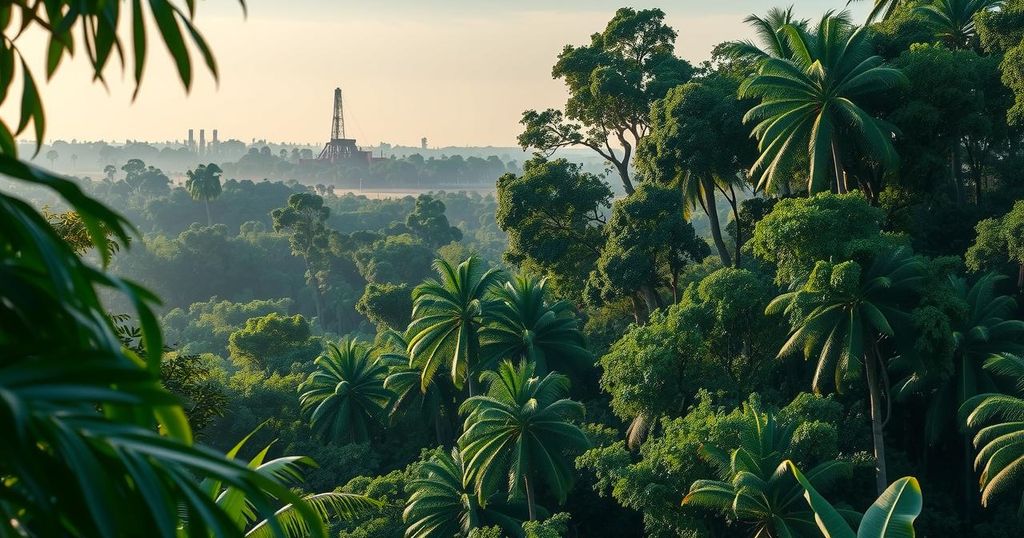Ahead of COP30, Brazil’s government is advocating for expanded oil drilling in the Amazon, despite its environmental significance. President Lula acknowledges the continued reliance on fossil fuels while justifying the move as necessary for funding a future energy transition. Environmental groups express strong opposition, citing the detrimental implications for climate leadership. The streamlining of environmental assessments raises concerns about protecting sensitive ecosystems and local communities.
In anticipation of COP30, President Luiz Inácio Lula da Silva’s administration is advocating for new oil drilling in the Amazon, the site for this year’s climate summit. As Brazil grapples with extreme weather events, the government’s push for more oil extraction raises concerns amid aspirations for fossil fuel-free discussions. Lula acknowledged the continued necessity of fossil fuels despite dreams of a future without them, stating, “I dream of a day when we no longer need fossil fuels, but that day is still far away.”
Recently, Brazil’s National Energy Policy Council approved the country’s entry into the Charter of Cooperation (CoC) with oil-producing nations linked to OPEC+. Environmental groups view this integration as a regression, emphasizing that it undermines Brazil’s potential leadership in transitioning away from fossil fuels. André Guimarães, director of the Amazon Environmental Research Institute, stated, “This is a disappointing setback for everyone who relies on the Brazilian government to lead a just transition away from fossil fuel exploration.”
Despite having ample oil wells, Brazil’s oil production is poised to increase by 36% over the next ten years due to new exploration projects. Should the country adhere solely to its existing wells, production would decline by 64% by 2035, according to 350.org’s analysis of IEA data. President Lula deflected criticism by referencing oil production in other nations as a comparative justification for Brazil’s actions.
Lula maintains that the profits from oil exploration will fund the transition to clean energy, although many environmentalists express skepticism towards this claim. Caetano Scannavino from the NGO Saúde e Alegria quipped, “It’s like recommending smoking twice as much to raise more money for lung cancer treatment.” Lula’s administration previously reallocated funds intended for health and education to address public debt, raising doubts about his future commitments.
As part of its oil ambitions, Lula’s government is pursuing an environmental license to drill in the ecologically sensitive Foz do Amazonas Basin. This license was previously denied due to concerns from IBAMA, Brazil’s environmental agency, regarding the absence of a robust mitigation plan by Petrobras, the state oil company. Environmental assessments concerning sensitive ecosystems in the area were also deemed necessary for informed decision-making.
Despite the initial denial, Lula’s ministers have been negotiating with the Ministry of Environment to expedite the approval process. IBAMA’s leadership has maintained that decision-making remains technical, yet presidential pressure could alter this trajectory. Lula expressed frustration with IBAMA’s operations, indicating a desire for swifter approvals, which has drawn criticism from environmental advocates.
The ongoing push to ease environmental regulations mirrors challenges faced by previous leftist administrations, including the controversial Belo Monte dam project, which disregarded Indigenous rights. Activists caution that the accelerated process for drilling approvals undermines adherence to necessary scientific evaluations, potentially threatening Brazil’s ecosystems and local populations.
Current strategic moves by Lula’s government include narrowing IBAMA’s assessment scope, thereby diminishing necessary environmental safeguards. Recent directives from the Ministry of Mines and Energy have reduced IBAMA’s ability to impose mitigation measures and conduct comprehensive environmental assessments, raising alarms over potential oversights. The granting of a drilling license now hinges on Petrobras’s emergency response plan for oil spills, which remains under scrutiny.
Brazil’s push for increased oil drilling in the Amazon amid hosting COP30 raises significant environmental and ethical concerns, contrasting with global efforts to mitigate fossil fuel reliance. President Lula’s justification for oil extraction as a means to finance renewable energy transition faces skepticism from climate advocates. The revisions to environmental regulations threaten the integrity of Brazil’s ecosystems and the rights of vulnerable communities, complicating the nation’s role as a climate leader. As the international community observes, Brazil’s decisions will impact both local environments and global climate commitments.
Original Source: www.climatechangenews.com






